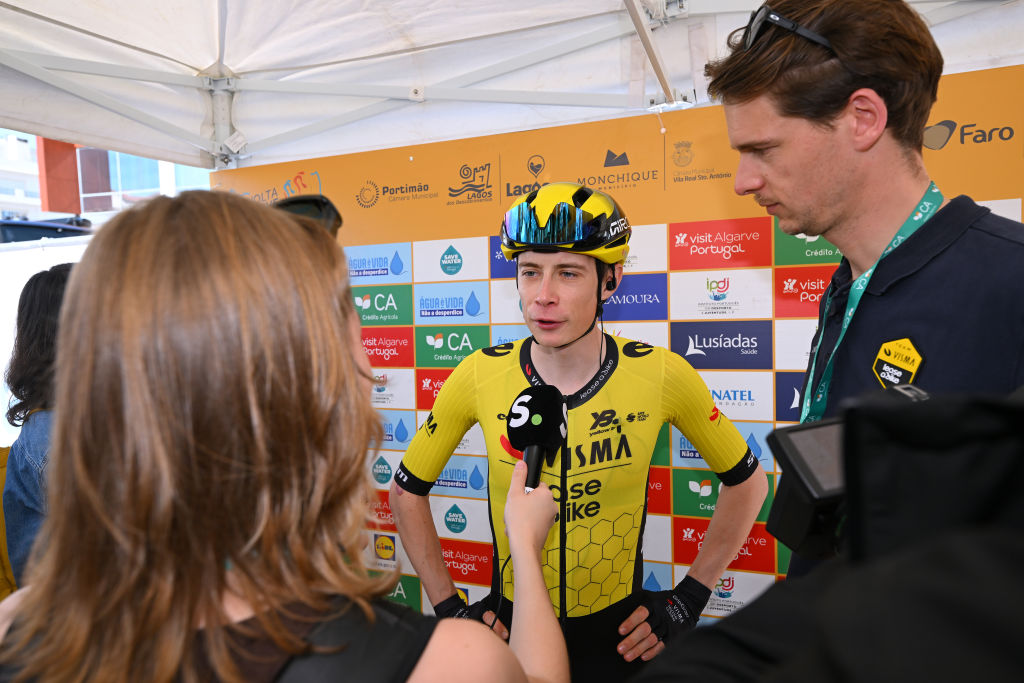'It shouldn't happen in cycling' - Jonas Vingegaard urges UCI and organisers to react to Volta ao Algarve stage chaos
Race begins again on stage 2 with no GC leader as fallout from stage 1 continues

Double Tour de France champion Jonas Vingegaard (Visma-Lease a Bike) called on the UCI and race organisers to react to the chaotic events of the end of stage 1 of the Volta ao Algarve, where the majority of riders went off course in the final kilometre, leading to a stage cancellation.
The organisation's error sparked surreal scenes, with Filippo Ganna (Ineos Grenadiers) staying on the right side of the barriers, which was the proper course, and taking a solo stage victory, only to be told after his solo sprint he was not the winner and the race would begin for real the following day.
Rather than the stage 2 summit finish at Alto da Foia being the main subject for discussion at the start in Lagoa on Wednesday, unsurprisingly the dramatic events of stage 1 remained the main topic at the sign-on and the team buses.
Vingegaard makes his career debut at the five-day Portuguese stage race the first event of his 2025 season. When asked at the stage 2 start if he was disappointed with what had happened in the finish at Lagos, apart from pointing out that it was a missed opportunity for his team sprinter Wout van Aert, Vingegaard made it clear that this kind of occurrence couldn't simply be ignored in general, either.
"Something like this shouldn't happen in cycling, I think the organisers should take this seriously and the UCI as well," Vingegaard said.
"It wasn't really clear where we had to go. In my opinion, in a sprint we have to have it clear where we have to go and where we should not go."
Although there was a nominal sign-on order for the stage 2 start in Lagoa, there was no ceremony beyond the usual speaker's announcement of the riders. Ineos Grenadiers were one of the last to make an appearance, and Ganna himself spoke briefly in Italian to reporters about what had happened, calling it a "messy situation".
Get The Leadout Newsletter
The latest race content, interviews, features, reviews and expert buying guides, direct to your inbox!
"It's important that in a situation like that, nobody was injured," Ganna pointed out, "But now let's think about today's stage and giving our best."
He gave a notably diplomatic answer when asked it had been the right decision, saying, "that's the decision they took, and obviously it would have been great to win. But that's what it is."
Although there was widespread relief that, above all, nobody had been injured, Vingegaard was far from alone in saying that the events in themselves could hardly be ignored by the authorities.
"It is a nice race but obviously what happened yesterday was not ideal for the race or for the safety of people around the race, and also in terms of the image of cycling," veteran French racer Romain Bardet (Picnic-PostNL) told Cyclingnews.
"I think everybody take good note of what happened and now we can move onto some proper racing. But it was almost a miracle that nobody got hurt.
"When you're a spectator in a race you expect to be safe, and then to be in the middle of a bunch coming at 65 kph - who knows what can happen in this situation when somebody decided to start walking?
"Anyway we got lucky with that one and I hope everybody learns a lesson from that. It was a quite unique situation, when you go in a finish need to have a clear way, because everybody disconnects a bit and is just thinking about his leadout. You need clear signs to know where you go."
If the Algarve is essentially a key warmup early season race for many WorldTour teams, for the numerous Portuguese Continental squads that make up the bulk of the country's local race scene, the 2.HC event is one of their main high points of the season - and as such, to have a day of competition cancelled represents an important setback.
"I think to be honest, everybody has to take their responsibilities," said Jose Azevedo, the longstanding sports director of the Portuguese squad Efapel Cycling and who had a long career as a top international racer.
"It's the organiser's fault because there should have been more indications not only on the roundabout itself, but also before, but it's also the riders fault because they need to know the course.
"For sure all the sports directors and not just us explained the finish in the briefing in the morning before the stage. But at the same time, the riders were going flat out, and they went on the wrong side."
Azevedo agreed with Bardet that it was very lucky that nobody had been injured as a result, "because nobody could have expected the riders would be coming on that side of the barriers, and particularly when the riders are so focussed".
"But that just shows, too, how important it is to have good signalling, because the riders are just concentrated on one thing - sprinting."
That said, he insisted, "Everybody has to take their share of the blame and made mistakes - the riders, the teams, the organisation. It's not fair to point the finger at one person. It has to be a lesson for everybody."
Alasdair Fotheringham has been reporting on cycling since 1991. He has covered every Tour de France since 1992 bar one, as well as numerous other bike races of all shapes and sizes, ranging from the Olympic Games in 2008 to the now sadly defunct Subida a Urkiola hill climb in Spain. As well as working for Cyclingnews, he has also written for The Independent, The Guardian, ProCycling, The Express and Reuters.
